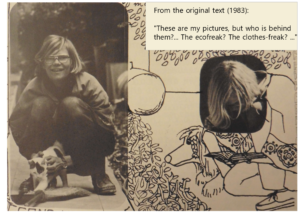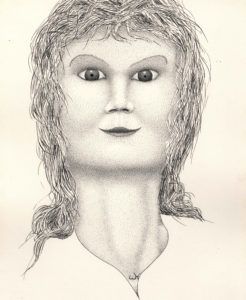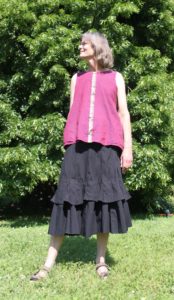In the last two years I have gone through a transformation, as a result of which I now experience and define myself as a woman. Two women whom I am very fond of interviewed me about this transformation process in August 2021. The first part of this interview is reproduced here. The questions in this part were posed by Jane Goldbach and address gender issues. Jane Goldbach is currently working on her masters study on transformation studies at the University of Flensburg. During her bachelors studies on ethnography in Heidelberg, she worked both as a volunteer and in a paid capacity at the TransitionHaus, a project of Transition Town Heidelberg. It was in this connection that we got to know each other.
Jane: Wiltrude, when I got to know you, you were known as Wolfgang, and now you go by Wiltrude. Please tell me about your path from Wolfgang to Wiltrude, what moved you, what accompanied you, what were your impulses?
W: First, I have to go back a bit, some aspects go back to my childhood. As a child, I had long hair and it didn’t bother me if people thought that I look like a girl. I played quite a bit with girls. But I wouldn’t ever had the idea of calling myself a girl. Those were very different times.

Self-presentation in school yearbook as a 17-year-old
During my university studies, I thought a lot about feminist issues, got to know various people, realized that I often understood women better than I could understand many men. Two women students whom I got to know appeared to me as highly intelligent when I talked with them one on one, but with their boyfriends they suddenly appeared stupid! They pretended to be more stupid than their boyfriends, so that the boyfriends would feel good! So I had some experiences about gender issues, and I found it much easier to identify with women who write about feminist issues than with the common image of manliness.
All the methods that men use to show that they are men appeared to me as proof of their idiocy. I really couldn’t accept such an image of manliness for myself. Also, I was not much interested in technology, but rather in complex relationships, whether those were ecological relationships or human relationships. Those are interests that are usually considered more feminine than masculine.

How I imagined myself as a woman when I was about 27 years old
I lived a long time in the United States, where I met my life partner Ishita, but then we moved to Germany. There I was involved with Transition Town Heidelberg, including a clothing swap, doing organizational work as well as clean up afterwards. After each such event, there is more clothing there than before. And it’s especially women who are involved, because most men aren’t interested. So then I was alone in a house full of women’s clothes, and one day I tried on a few. That was really intoxicating for me, I was overwhelmed! I found men’s clothing totally boring, and still do. Pants and shirt, only a few cuts, few colors. But when I tried on a skirt or a dress and it fit, then I didn’t want to take those pieces of clothing off any more! As a result, soon I wore women’s clothes in more and more different contexts. That was simply the right clothing for me!
This started a process beginning in early 2019, by now about two and a half years. Soon I wore almost exclusively women’s clothing – that is, often men’s shirts, but at least wearing a skirt, and I felt amazingly good doing that.

Then I though of a woman’s name for myself, Wiltrude, which is a combination of my middle names Rudolf and Willi. The name means “the strong willed woman”, a good name! Initially I used the name rather hesitantly. Jane, you were there at the name-giving ceremony, you were so supportive along with the other women there! Later I asked people to call me WoWi, as a combination of Wolfgang and Wiltrude. A few months ago I came to realize that it really is better if people just call me Wiltrude, that feels really good!
Since I have asked the people close to me to call me Wiltrude, and they actually all do that, the depressions from which I had often suffered until then have totally disappeared! My general mood is simply much better! And so there is no going back! So I am now Wiltrude!
J: That’s a really great experience as you describe it, that you were able to heal yourself from your depression, by changing yourself. That is really touching! By now I know from various contexts, that people ask how they want to be called, and what are your pronouns. Is your pronoun “she”, and do you consider yourself to be non-binary, or what are the terms by which you want to be called?
W: I do prefer it if people talk about me in the female form, but not everybody has to do that. For example, where I work, people still refer to me as a man. Everybody knows, that I constantly wear women’s clothes, but there I am still Mr. Höschele or Wolfgang. That’s okay with me. I don’t feel the need to explain to people to whom I am not close that I am really a woman. It’s easier to tell them that I am a man who likes to wear women’s clothes. Everybody accepts that. In that sense, non-binary is really very fitting for me. I can also say that in my inner being, psychologically, in my soul I am a woman, but bodily I am a man. That is simply the case, and there is no necessity to change that. I don’t have to change my body because of that. I am not trying to totally become a woman.
J: Exactly, you feel or see both in yourself, and want to live both.
W: Yes.
J: How is it when you move around in public, when you sit in the tram or go on a walk, do you experience unusual situations or get into conversations?
W: Rather rarely actually. Some people look at me a bit longer, maybe just to figure out whether I am a man or a woman. Of course, I can’t read their minds, I don’t know what they think. But altogether I must say I raise very little attention, and I am very satisfied with that.
Sometimes, especially in the beginning when I still had a mustache, there were more frequent comments, but mostly positive. One woman called to me on the pedestrian crossing, saying that she thought it was great that a man has the courage to wear a skirt! Once a mother came running after me with her three or four-year-old son. The son didn’t dare talk to me, but his mother spoke for him. She said that he thinks it is great that I wear a skirt in public, because he wears skirts at home but doesn’t dare do that in public! These kinds of reactions I have experienced, which was really gratifying! Very rarely there has also been a reaction that was negative in some way, but in two years that happened maybe three times.
J: That’s a really beautiful story, how you can appear as a positive model and you get feedback about that on the streets!
When you talked about your feminist times and your studies, you said that there was a lack of positive male role models and that you found the female role models much more positive. Have you found new role models now because you can identify with them more easily, because you see yourself as a woman and call yourself a woman?
W: I can’t really think of specific individuals. The authors whom I have read and that I liked, I still like, regardless whether they are women or men.
But I just feel more relaxed and free to orient myself according to women as role models, or according to ideas of what is appropriate behavior or interests for women. I don’t need to think at all about whether it is considered appropriate if I do something as a man, because I’m not a man!
In general, I think that men are not challenged enough concerning working on relationships. Men are expected to be concerned with technology, or with control, with earning money, but they are not really expected to concern themselves with complex issues concerning relationships. Women often blame them that they don’t do this, but they are not really prepared from childhood to address such issues.
But I find relationship issues to be the really important issues for society. We have more than enough technology but far too little engagement with questions how we can live together better. How can we support each other so that we all can live well? How can we give space for other living things, other species, so that they also can live? All this is complex work on relationships, both concerning ecosystems and human relationships. We have to put enormous work into this. This involves skills that so far women have been educated to acquire more than men.
J: I find that really interesting. You have talked about your becoming a woman as liberation. Is that what you mean, that you feel freer to address issues that you find interesting and that move you?
W: Yes, I find this image of maleness restricting. It is quite simple, one can create a simple world for oneself, in which one let’s say works in a technically oriented job to earn money. If one earns more money, then one is successful. Particularly technically oriented jobs are often paid better than those focusing more on human relationships. But for a person for whom all this is not enough, then this established picture of maleness is restrictive. I actually always told myself, I want to be the best person I can be, and for that maleness or femaleness is really totally irrelevant. But, in some way this image of masculinity is still restrictive. So it’s a liberation for me to say, I am a woman, and I don’t need to waste a single thought on masculinity!
J: Now we have heard a lot about what motivated you personally on your path. Do you understand this as a private matter, your particular path of becoming woman as liberation, or do you also want to use your clothing style, which is always also a message to others, as a conscious message to the world?
W: Yes, with one’s choice of clothing every person communicates something to other people in their environment, that is inescapable. Of course, I don’t know what exactly people read, but they can certainly read that I am not a normal man, let’s say! That perhaps I identify more with being a woman, and that I certainly have no fear to present myself in a way that will be seen as feminine. That I certainly do not consider womanliness to be anything inferior to manliness. It is inescapable that I communicate a lot, and I want to do that. I certainly want to look different from a conventional man!
J: Now I would like to address your social vision. In your work on systems change and systemic consulting, in your proposals for an economy of abundance of life, I have experienced you as a person who thinks very systemically and is oriented to solutions. How would you describe the discourses about gender, transgender, non-binariness from a systemic perspective? What moves you about this and what are you wishes for a future society?
W: Gender is often described as a performance, that one performs as a woman or a man or something else, and that one has to learn how to do this. This means that kids have to learn how to present themselves as boys or girls or something else. How they finally do that, for that every person finds their own solution, in interaction with other people. That is a systemic interaction with many different people. What emerges from this can never be predicted exactly, and that is what creates societal change. There has been quite a lot of change in the last several decades, but there is a lot that has yet to change if we are to successfully address the social and ecological challenges of our time. What I do specifically is not meant to be a model for other people, but just my specific solution, my particular gender bricolage. Every person needs to find their own solution. I think in any case it is important to be open to a variety of solutions, and that there is not a single solution, but many. It is important to be able to experiment, so that we can freely find good solutions that contribute to the abundance of life of all people.
J: Thank you so much for this fascinating perspective and the valuable vision that you stand for. I find it very touching and moving. My heartfelt thanks for this wonderful interview, Wiltrude!
W: Many thanks to you!



